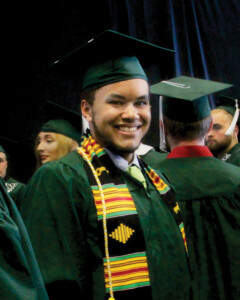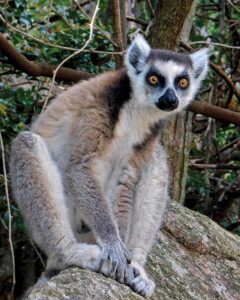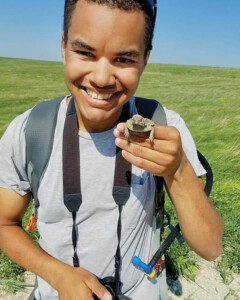Asking James Lee ’19 to pick a favorite ESF experience is akin to asking a parent to pick a favorite child — it’s seemingly impossible.
Lee, who graduated in May with a degree in environmental biology, speaks quickly when talking about the last four years as if to slow down would mean leaving something out. Lee filled his time at ESF with classwork, internships, extracurriculars, field trips and international travel, each leaving a lasting impression.
He was engaged in research activities as a work-study student at the Cranberry Lake Biological Station and the Newcomb Adirondack Ecological Center under Stacy McNulty ’97 and Natasha Karniski-Keglovits ’14. He did small-mammal trapping, loon surveys and nest searching along the shore.
He was an undergraduate teaching assistant for Dr. Shannon Farrell during his junior and senior years.
It was his involvement in the Wildlife Society, including serving as club president, that brought all his ESF experiences together. Leading the club was a transformative experience for the Long Island native. “It’s probably the most difficult but also the most thorough leadership experience I’ve had thus far. It’s almost a synthesis of what I have done in college and other activities,” he said. His involvement with the Wildlife Society allowed him to pursue activities and experiences he enjoyed, such as a trip to Pennsylvania to view elk while they were running and a bird-banding workshop at Montezuma Wildlife Refuge in Seneca Falls, New York.
He didn’t stop with one club or activity on campus. Lee was also trip coordinator for the Society of Conservation Biology, the secretary of the Herpetology Club and the secretary for the Society of Ecology and Restoration as well as a member of the Guy Baldassarre Birding Club.
“Birds and reptiles are my main interest. I have the most experience with birds so far,” he said. But he is open to expanding his horizons.
“I did a brief internship with Long Island Aquarium as a marine mammal training intern, which was a lot of fun,” he said. He trained harbor seals, grey seals and sea lions and worked with river otters and Japanese macaques.
The following summer, he went to Emporia State University in Kansas to work on grassland bird research, including nest searching and monitoring for a number
of species.
Lee took a semester to study abroad in Madagascar at the Ranomafana National Park during his junior year. While there he did small mammal tracking as well as surveys of rainforest birds and behavioral monitoring of primates.
“That was probably the best experience of my life,” he said. The lemurs, found only in Madagascar, made a lasting impression. “There are about 110 species of lemur, but I only saw about 19. If I can ever afford to go back I most certainly would like to.”
One day, he and his classmates went hiking to find a species of lemur called indri. The outing left a big impression. “They have this incredibly haunting call that reverberates through the forest,” Lee said. “They’re also the largest living species of lemur. It’s just burned into my memory. I think about it almost every day.”
In the summer of 2018 Lee had “another great job — another of my favorites” at the University of Toledo in Ohio.
“I was doing work with redheaded woodpeckers, box turtles and spotted turtles, all of which are species I am very fond of. I did mainly nest searching for all those species and radio telemetry on them as well, which was a lot of fun .… It can be very rewarding getting to track species in the field, recording their behaviors, what they’re eating, what their activities are.”
As graduation approached, Lee’s plans were fluid. He applied for a number of wildlife research positions, ranging from working with piping plovers to hellbenders, and had plans to travel in Europe with friends.
“I got interested in wildlife because it’s thrilling, and I think it’s incredibly rewarding to see,” he said. “At times I feel like that kind of desire is selfish in some respects, but I think that it doesn’t matter. Of course, I want to help others along the way — strongly so — but I think it’s all right to be
a little selfish.”
Karen B. Moore is the senior writer in the Office of Communications and Marketing.





